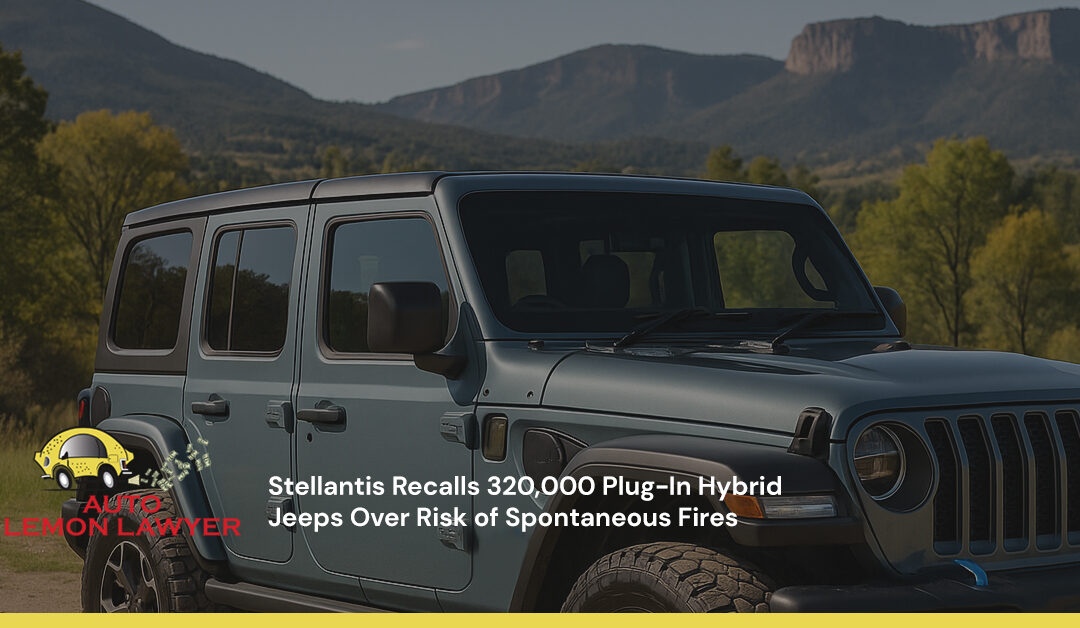On Tuesday, Nov. 4, the National Highway Traffic Safety Administration (NHTSA) announced that Stellantis has recalled certain plug-in hybrid models of the 2020–2025 Jeep Wrangler and 2022–2026 Jeep Grand Cherokee. According to federal filings, Stellantis initially submitted the recall notice on Oct. 30.
The recall covers 228,221 Jeep Wrangler plug-in hybrids (PHEVs) and 91,844 Jeep Grand Cherokee PHEVs. According to NHTSA, the issue stems from the vehicles’ battery packs—specifically, some may contain cells with damage to the internal separator. The separator is a thin membrane inside the battery that keeps the anode and cathode apart while still allowing ions to flow. If the separator is compromised, it can increase the risk of a thermal event.
This is not the first recall related to this issue. In September 2024, Stellantis recalled more than 150,000 hybrid Jeep models for the same battery concern and later implemented a software-based fix. According to NHTSA filings, the remedy did not require new parts in most cases.
After the previous recall and software update, Stellantis reported nine additional vehicle fires involving models that had already received the remedy, according to NHTSA. The automaker has also acknowledged one injury linked to the incidents, though the company did not provide further details when asked.
Owners are advised not to charge their vehicles and to keep them parked outdoors, away from buildings and other cars, until a repair is provided. NHTSA noted that charging a battery that may be damaged can significantly increase the risk of a fire, as fully charged batteries pose a higher ignition hazard.
In a statement to the Free Press, Stellantis said a repair solution is “imminent” and that affected owners will be notified once they can schedule service appointments.
NHTSA Recall Information
| Manufacturer Name: | Chrysler (FCA US, LLC) |
| Submission Date: | 30-Oct-25 |
| NHTSA Recall No.: | 25V741 |
| Manufacturer Recall No.: | 68C |
| Total number of potentially involved: | 320,065 |
| Estimated percentage with defect: | 5% |
Vehicle Information
Vehicle 1: 2020-2025 JEEP WRANGLER
Fuel / Propulsion: Plug-In Hybrid
Production Dates: Jul 01, 2020 – Aug 25, 2025
Number of potentially involved: 228,221
Descriptive Information: Some 2020-2025MY Jeep Wrangler plug-in hybrid electric vehicles (“PHEVs”) may have been built with a high voltage (“HV”) battery pack manufactured with cells which may be susceptible to separator damage.
The suspect vehicle population began on July 1, 2020, when PHEV production began, and ended on August 25, 2025, when the last vehicle with a suspect HV battery was built. Vehicle manufacturing records were used to determine the suspect period.
Similar vehicles not included in this recall are not PHEVs.
Vehicle 2: 2022-2026 JEEP GRAND CHEROKEE
Fuel / Propulsion: Plug-In Hybrid
Production Dates: Jul 23, 2021 – Oct 15, 2025
Number of potentially involved: 91,844
Descriptive Information: Some 2022-2026MY Jeep Grand Cherokee PHEVs may have been built with a HV battery pack manufactured with cells which may be susceptible to separator damage.
The suspect vehicle population began on July 23, 2021, when PHEV production began, and ended on October 15, 2025, when the last vehicle with a suspect HV battery was built. Vehicle manufacturing records were used to determine the suspect period.
Similar vehicles not included in this recall are not PHEVs.
Description of the defect or noncompliance: In rare circumstances, a battery pack may contain cells with separator damage. Separator damage, combined with other complex interactions within the cells, may lead to a vehicle fire.
Description of the safety risk, including crash, fire, death, injury: A vehicle fire can result in increased risk of occupant injury and injury to persons outside the vehicle. Vehicle risk is reduced when the battery charge level is depleted. Accordingly, owners are advised to refrain from recharging. Out of an abundance of caution, FCA US is also advising owners of these vehicles to park away from structures or other vehicles until the remedy is obtained.

Over the past 31+ years, I have been devoted to standing up for consumers, tackling intricate class action consumer litigations, handling complex multi-district cases, and recovering millions of dollars for my Lemon Law clients. Being admitted in District Courts in Louisiana, Texas, California, Michigan, Florida, and Indiana, my practice has led me to represent clients all over the United States in my Lemon Law cases. Regardless of your location, my firm is committed to offering the highest level of professional support, especially in Lemon Law.

